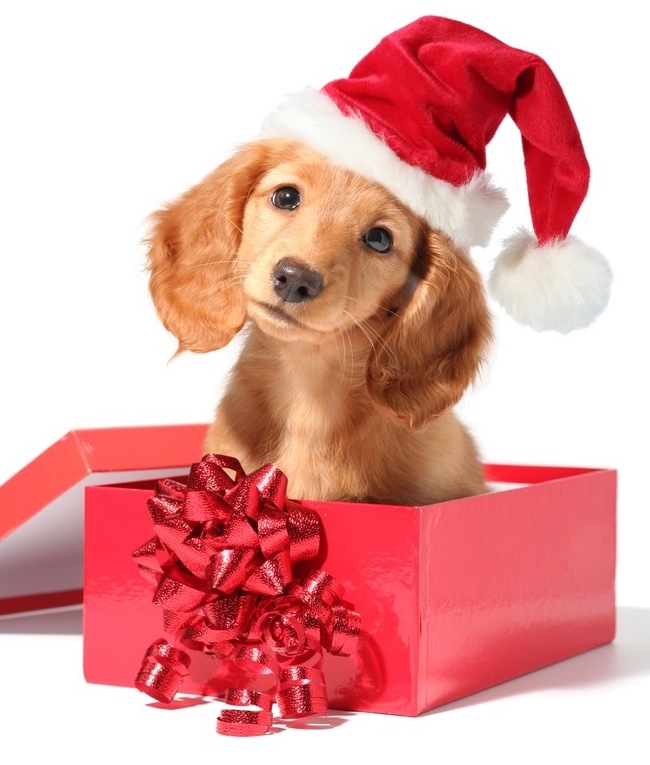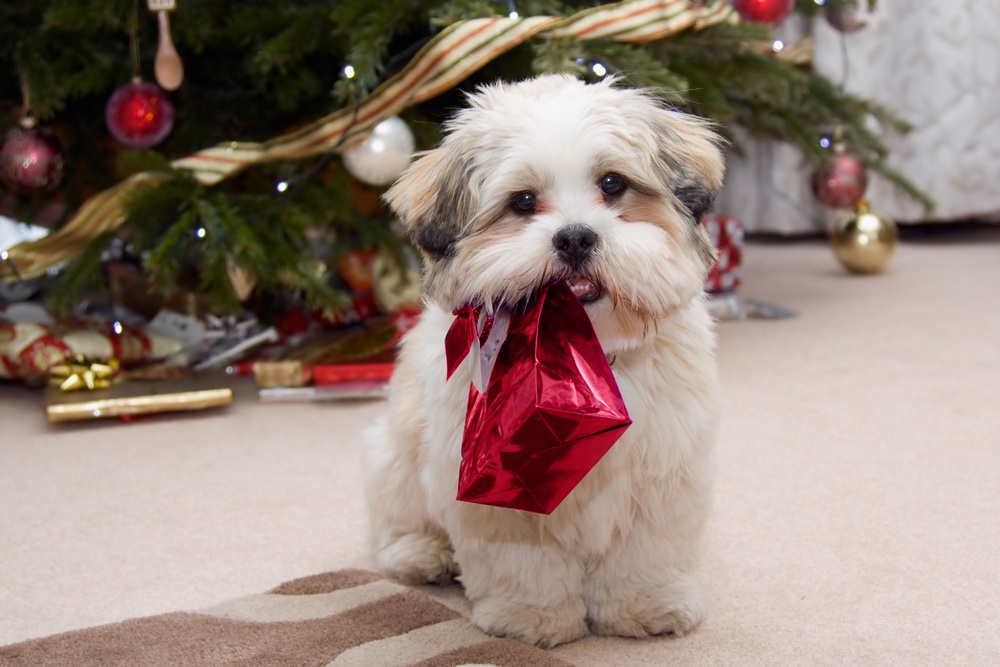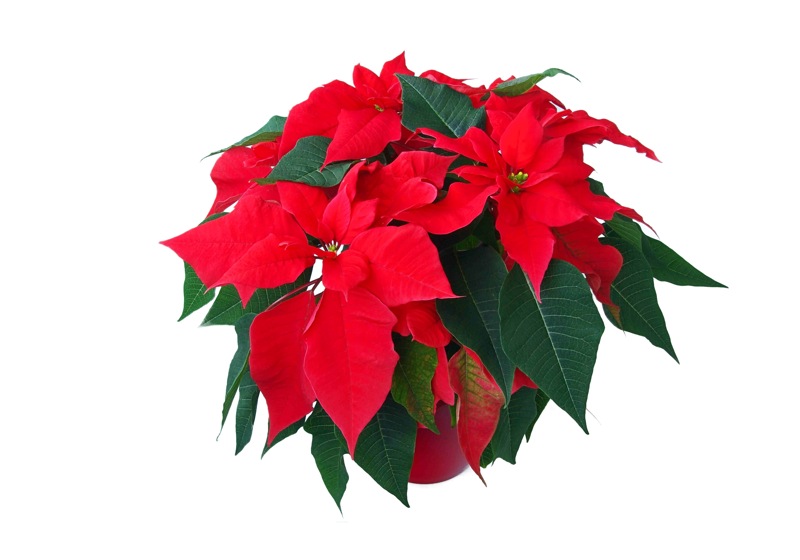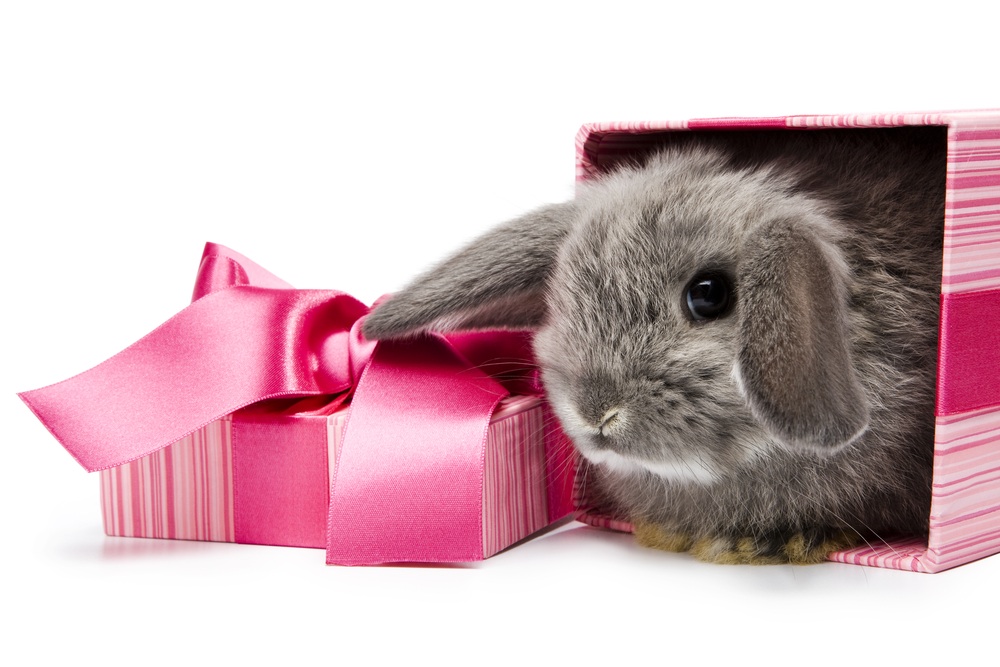Pets at Christmas-time

Each year, problems crop up with pets at Christmas which, with a little foresight, could often be avoided. Dogs and cats may suffer from the effects of gluttony at this time of year, just as we can. It is important to keep temptation firmly out of their reach therefore, to prevent an unscheduled trip to your vet's surgery during the festive season.
Stay alert
Turkeys can provide an irresistible challenge for pets, so take particular care to place a frozen bird in a safe locality while you are defrosting it. Otherwise, your cat may simply leap up on to the work surface and help itself.
Dogs are likely to adopt a different approach, standing on their hind legs and using one of their front paws to nudge food towards them. They are far less choosy than cats. It won't just be the turkey. Christmas cakes, mince pies, cheese straws - all are fair game for dogs and not only may you lose irreplaceable food, but you can also end up with smashed plates as well.
After the festivities, be careful how you dispose of the turkey's carcass. Avoid leaving the remains in a bin bag where it would be easily accessible to pets. Turkey bones are usually sharp when snapped, and they will stick readily in an animal's throat, causing it to retch and gag in severe distress. A bone in this position can even be fatal, and so you may have to be prepared to take immediate action to save the animal's life.
Faced with this situation, ideally ask someone else to hold your pet so that you can concentrate on opening its mouth. Place your left hand on either side of the top jaw, and then carefully prise down its lower jaw with your other hand. In a good light, you should be able to see the bone, which is likely to be towards the back of the mouth. Aim to remove this carefully with your fingers, taking care not to be bitten, or alternatively, you could possibly use a pair of pliers.
Chocoholic dogs

Dogs may gulp down the contents of an entire box of chocolates in minutes, eating wrappers and all. If this happens, there is a distinct likelihood that your pet will be sick soon afterwards, so be prepared for this possibility.
A dog which has gorged itself on chocolate can also suffer from diarrhoea as well. Ironically, a mild diet of turkey and rice can be a good way to help your pet recover under these circumstances !
Hopefully, there will be no more serious symptoms, but chocolate naturally contains a chemical called theobromine which is poisonous to dogs. Milk chocolates are less toxic than dark chocolate, while theobromine is not present in significant quantities in chocolate treats sold specifically for dogs to cause any harm. You can find more about this here.
Breathing difficulties and even death can follow as the result of theobromine poisoning. If you are worried, then contact your veterinary surgeon for advice. Some other pets may also display peculiar sensitivities to certain foods. Avocado is known to be fatal to parrots and canaries, so never offer this as a Christmas treat from the salad bowl.
Plant problems

The popular poinsettias, with their red bracts, look stunning among the Christmas decorations but they are among those plants which could be deadly to birds. Ivies, winter cherry and dumb cane are also reputedly toxic, and are potentially dangerous to house rabbits as well, if left within their reach.
Christmas trees may present problems as well. They need to be firmly supported, because otherwise a large, boisterous dog can easily knock over a tree, injuring itself and possibly fusing the lighting system in the home as well. Don't leave the flex easily accessible either, as a puppy particularly may decide to chew on this, with potentially fatal consequences.
If you have a rooted tree, don't forget to cover over the soil adequately, because otherwise, your cat may use it as a toilet. Only place plastic decorations on the lower branches, so there will be no risk of your cat cutting its paw. This could otherwise happen if a glass ornament broke while your pet played with it. Cats - especially Siamese-type individuals - may even chew any trailing ends of tinsel, and can end up swallowing it, with potentially deadly consequences, so make sure this is placed well out of their reach.
Needles

You must also watch out for needles from the tree, because these can stick in the paws or coats of dogs, cats and rabbits, causing intense pain. Always suspect the presence of a needle if your pet suddenly shows a reluctance to use one of its feet.
Like grass seeds, these needles can penetrate a long way into the foot, often between the pads of the paw, and may even start to work up the leg, so arrange a veterinary appointment without delay. Don't try to inspect the foot yourself - you are likely to end up being bitten or scratched.
Be sure to vacuum the area under the tree regularly to reduce the accumulation of needles on the floor. Some types of Christmas tree now available are quite resistant to dropping their needles, even if they are not rooted, while there are also sprays to slow needle drop. Alternatively, you may simply prefer to have an artificial tree.
Service as usual
Finally, remember that if your pet does fall ill over the Christmas period, you will be able to obtain veterinary help, as all practices provide a year-round, 24 hour service. But avoid calling out your vet unless you are faced with a real crisis. After all, vets have families too !
* Do you have a pet bird too? If so, aim to keep your pet safe over Christmas by following this list of Top Ten Tips.